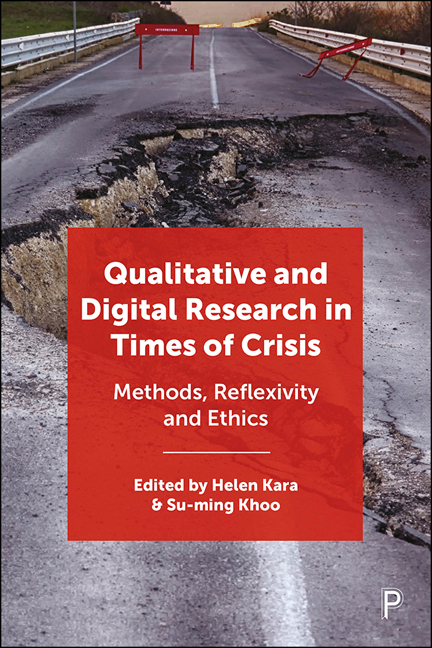10 - Qualitative data re-use and secondary analysis: researching in and about a crisis
Published online by Cambridge University Press: 13 May 2022
Summary
Introduction
The COVID-19 pandemic is the biggest global crisis of an era, rewriting norms and expectations woven into the social fabric of everyday life. Perhaps unsurprisingly, questions about the differential economic, social, and relational impacts of this crisis have preoccupied social science researchers, policymakers, and service providers across the globe in 2020. The pandemic, and various forms of lockdown imposed in most majority and minority world contexts, has dramatically altered our lives, albeit in different ways. Like other times of crisis, such as the 2008– 12 global economic recession, these unfolding dimensions of rupture and change preoccupy socio-historical researchers now and will do so long into the future.
Social scientists have a unique and imperative role in advancing knowledge of the unfolding impacts of COVID-19 including how these new social conditions are affecting people's lives, needs, attitudes, and behaviours. Yet the changes wrought by the crisis have also simultaneously altered the conduct of social sciences research, placing new restrictions on how new knowledge may be produced. In this chapter, we consider how the re-use of qualitative data and its preservation has become especially pertinent as part of an important repertoire of research methods. Our position entails a more nuanced ethical sensibility towards the archiving and reuse of existing research data in the context of capturing the evolving and uneven impacts of crises and understanding the social contexts from which they emerge. We therefore argue for, and raise awareness of, the tremendous value and potential for qualitative data re-use via the associated methodology of qualitative secondary analysis (or QSA) and make a case for data preservation and archiving.
We are prompted to write this chapter because, while there has been significant innovation in methods of qualitative data re-use and QSA over the past two decades, these have not traditionally been considered as part of the ‘go to’ methodological repertoire for qualitative, in-depth engagement (for example, interviews, participatory methods). In the early stages of the national lockdown, there was a proliferation of work newly engaging with the various potentials of digital research methods and resources for research.
- Type
- Chapter
- Information
- Qualitative and Digital Research in Times of CrisisMethods, Reflexivity and Ethics, pp. 156 - 171Publisher: Bristol University PressPrint publication year: 2021

